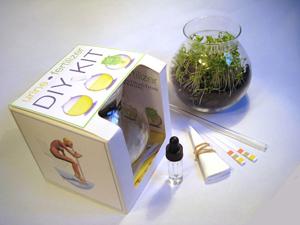DIY: How to turn urine into fertilizer
The DIY Kit turns urine into fertilizer. (Image: brittaandrebecca.org)
The following is not a full transcript; for full story, listen to audio.
Story by Cyrus Farviar, “The World”
At this year’s human nature-themed Ars Electronica 2009 festival in Linz, Austria, numerous gadgets and innovations were showcased, including one system that turned urine into fertilizer.
Britta Riley and Rebecca Bray created the system, which utilizes magnesium chloride to bond with the nitrogen, phosphorus, pharmacological micropollutants, and other metabolites in urine. The result is a solid fertilizer called struvite, which is great for plants; and a liquid by-product which Riley and Bray say is less damaging to the environment than urine.
Bray described the chemical process: “It’s a really strong reaction, you’re going to see it phizes and it gets really hot, and it happens really quickly.”
The solid fertilizer is “very, very concentrated” said Bray, and needs to be diluted in water before administering to plants. She recommends four liters of water per vial of fertilizer, and half a liter of the resulting liquid used every two to three months to fertilize each plant.
“Basically what we did was we took a process that environmental sewage researchers have been proposing to do on a massive scale, and we scaled it down to something that an individual could do,” said Riley.
Riley and Bray came to develop the system through their work on an ocean preservation project, where they saw problems with human waste and pollution of the waterways. This led them to research ways in which to treat waste and make it less harmful to the environment.
“In nature, we would be peeing out in the woods and it would be becoming fertilizer again,” said Riley. “But because we pee into a toilet and we think that it’s waste and it goes away somewhere, but it’s actually going out to our waterways, and creating hazardous conditions for all the aquatic ecosystems that are there, and that’s not where our pee should be going, really.”
To create the system, Riley says she and Bray studied lab manuals from environmental sewage researchers and worked with their network of family, friends and colleagues which included biochemistry students and professors, farmers and others.
“So we just pieced together all of this knowledge and figured out how to do this sewage treatment process by experimenting using tools that we had in my kitchen, and basically testing our own pee till we got to the point where it actually worked.”
After a year and a half, the urine to fertilizer kit was developed.
Not everyone embraced the work said Bray, “especially because we asked them to pee all the time for us, and we get mad at them when they don’t contribute their pee to our experiments.”
“My boyfriend got really tired of our refrigerator being full of pee,” said Riley.
For more on the kit, visit brittaandrebecca.org.
PRI’s “The World” is a one-hour, weekday radio news magazine offering a mix of news, features, interviews, and music from around the globe. “The World” is a co-production of the BBC World Service, PRI and WGBH Boston.
